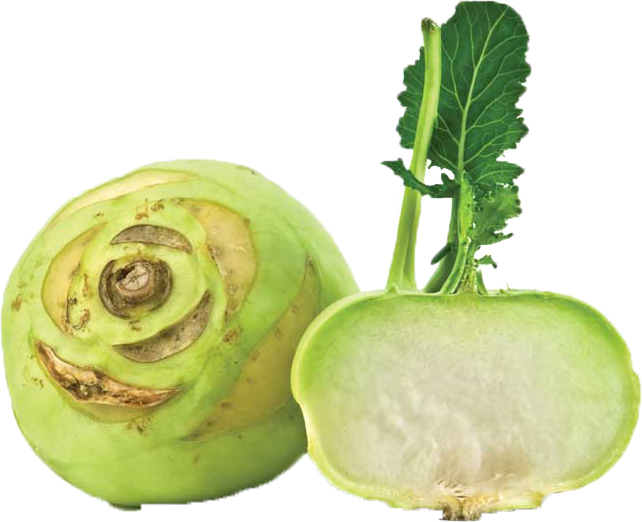|
Mildly sweet,
succulent Kohlrabi is notably rich in vitamins and Dietary fibre; but has only
27 calories per 100 g, negligible amount of fat, and zero cholesterol.
Fresh kohlrabi
stem is rich source of vitamin-C; provides 62 g per 100g weight that is about
102% of RDA. Vitamin C (ascorbic acid) is a water-soluble vitamin and powerful
anti-oxidant. It helps body maintain healthy connective tissue, teeth, and gum.
Its anti-oxidant property helps body protect from diseases and cancers by
scavenging harmful free radicals from the body.
Kohlrabi, like
other members of the brassica family, contains health-promoting phytochemicals
such as isothiocyanates, sulforaphane and indole-3-carbinol that are appears to
protect against prostate and colon cancers.
This stem
vegetable is especially contain good amounts of many B-complex group of
vitamins such as niacin, vitamin B-6 (pyridoxine), thiamin, pantothenic acid
etc that acts as co-factors to enzymes during various metabolism inside the
body.
Knol-knol notably
has good levels of minerals; copper, calcium, potassium, manganese, iron, and
phosphorus are especially available in the stem. Potassium is an important
component of cell and body fluids that helps controlling heart rate and blood
pressure by countering effects of sodium. Manganese is used by the body as a
co-factor for the antioxidant enzyme, superoxide dismutase.
In addition, its
creamy colour flesh contains small amounts of vitamin A and carotenes.
Kohlrabi leaves
or tops, like turnip greens, are also very nutritious greens abundant in carotenes,
vitamin A, vitamin K, minerals, and B-complex group of vitamins.
Digestive Health: Just like most of the cruciferous vegetables, kohlrabi is a
great source of dietary fibre that can seriously improve your digestive health.
Fibre helps to move your bowels along, eliminating constipation, reducing
cramping and bloating, and generally improving the quality of your
gastrointestinal system, while also maximizing your nutrient uptake efficiency.
Weight Loss Booster:
Kohlrabi is the perfect diet vegetable, because it is low in
calories, high in fibre, and is packed with beneficial nutrition. Fibre makes
us feel full, so even if the volume of food consumed isn’t that great, we
resist the urge to snack between meals or overeat.
Nerve and Muscle
Function: Although this characteristic of potassium
isn’t discussed too often, it is one of the key players in muscle and nerve behaviour
in the body. It helps us move, breathe, react, and function every single day.
As such, the high potassium content in kohlrabi makes it a great addition to
your diet to keep alert, energetic, and in great shape!
Blood Pressure: That same potassium content also function as a vasodilator,
reducing the strain on the cardiovascular system by easing the tension of blood
vessels and arteries. This can increase circulation throughout the body,
oxygenating key areas, and lowering the risk of cardiovascular events like
strokes or heart attacks. Potassium is also a key part of fluid regulation in
the body, as it works with sodium to regulate fluid movement between cells.
Iron Deficiency: The significant levels of iron found in kohlrabi go hand-in-hand
with the potassium content, as iron helps to increase the RBC in the body,
which is essential to prevent anaemia (iron deficiency), which is characterized
by weakness, fatigue, headaches, stomach disorders, disorientation, and general
immune system failure. The calcium found in kohlrabi also improves the uptake
of iron by the body, so kohlrabi is an all-around booster for both the immune
and cardiovascular systems.
Bone Strength: As we get older, our bones inevitably weaken, but one of the
best ways to avoid or significantly slowdown that process is by eating
mineral-rich food, which includes vegetables like kohlrabi, with high
manganese, iron, and calcium contents. Preventing osteoporosis is something
that can be done when you’re young, so keep those calcium levels high!
Vision Health: Protecting our ability to see the world is a key part of human
nutrition, and nothing is better for that than vitamin A. Kohlrabi is a rich
source of carotenes, including beta carotene, which acts as an antioxidant
compound in the body, particularly in the ocular area. Vitamin A can help to
prevent macular degeneration and slow down or eliminate the appearance of cataracts.
This is done by neutralizing the free radicals in the eye and preventing
oxidative stress.
Metabolism: For those people who want to regulate their metabolism or feel
that something in their body just isn’t working properly, they should try kohlrabi,
which is a rich source of B-vitamins, many of which play key roles in enzymatic
processes within the body. This vital network of reactions and processes
determines how functional and efficient our bodies are, so making sure to add
B-vitamin-rich foods like kohlrabi to a weekly diet can really help!
Cancer Prevention: Kohlrabi is one of those amazing vegetables that seems blessed
with high levels of phytochemicals, particularly glucosinolates, which are
considered some of the most important antioxidant compounds for the prevention
of cancer, including breast and prostate cancer.
A Final Word of Caution: Aside from a very rare case of a food allergy, kohlrabi is not
the source of any known allergens and can be eaten without worry by the vast
majority of people – especially for those looking for a healthier form of
cabbage!
|

